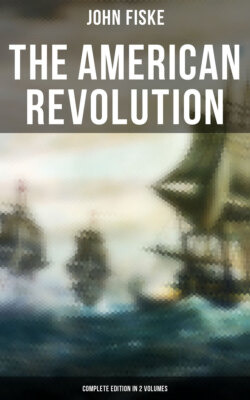Читать книгу THE AMERICAN REVOLUTION (Complete Edition In 2 Volumes) - Fiske John - Страница 57
На сайте Литреса книга снята с продажи.
Some lessons of the “Massacre”
ОглавлениеTable of Contents
This story of the Boston Massacre is a very trite one, but it has its lessons. It furnishes an instructive illustration of the high state of civilization reached by the people among whom it happened,—by the oppressors as well as those whom it was sought to oppress. The quartering of troops in a peaceful town is something that has in most ages been regarded with horror. Under the senatorial government of Rome, it used to be said that the quartering of troops, even upon a friendly province and for the purpose of protecting it, was a visitation only less to be dreaded than an inroad of hostile barbarians. When we reflect that the British regiments were encamped in Boston during seventeen months, among a population to whom they were thoroughly odious, the fact that only half a dozen persons lost their lives, while otherwise no really grave crimes seem to have been committed, is a fact quite as creditable to the discipline of the soldiers as to the moderation of the people. In most ages and countries, the shooting of half a dozen citizens under such circumstances would either have produced but a slight impression, or, on the other hand, would perhaps have resulted on the spot in a wholesale slaughter of the offending soldiers. The fact that so profound an impression was made in Boston and throughout the country, while at the same time the guilty parties were left to be dealt with in the ordinary course of law, is a striking commentary upon the general peacefulness and decorum of American life, and it shows how high and severe was the standard by which our forefathers judged all lawless proceedings. And here it may not be irrelevant to add that, throughout the constitutional struggles which led to the Revolution, the American standard of political right and wrong was so high that contemporary European politicians found it sometimes difficult to understand it. And for a like reason, even the most fair-minded English historians sometimes fail to see why the Americans should have been so quick to take offence at acts of the British government which doubtless were not meant to be oppressive. If George III. had been a bloodthirsty despot, like Philip II. of Spain; if General Gage had been another Duke of Alva; if American citizens by the hundred had been burned alive or broken on the wheel in New York and Boston; if whole towns had been given up to the cruelty and lust of a beastly soldiery, then no one—not even Dr. Johnson—would have found it hard to understand why the Americans should have exhibited a rebellious temper. But it is one signal characteristic of the progress of political civilization that the part played by sheer brute force in a barbarous age is fully equalled by the part played by a mere covert threat of injustice in a more advanced age. The effect which a blow in the face would produce upon a barbarian will be wrought upon a civilized man by an assertion of some far-reaching legal principle, which only in a subtle and ultimate analysis includes the possibility of a blow in the face. From this point of view, the quickness with which such acts as those of Charles Townshend were comprehended in their remotest bearings is the must striking proof one could wish of the high grade of political culture which our forefathers had reached through their system of perpetual free discussion in town meeting. They had, moreover, reached a point where any manifestation of brute force in the course of a political dispute was exceedingly disgusting and shocking to them. To their minds, the careless slaughter of six citizens conveyed as much meaning as a St. Bartholomew massacre would have conveyed to the minds of men in a lower stage of political development. It was not strange, therefore, that Samuel Adams and his friends should have been ready to make the Boston Massacre the occasion of a moral lesson to their contemporaries. As far as the poor soldiers were concerned, the most significant fact is that there was no attempt to wreak a paltry vengeance on them. Brought to trial on a charge of murder, after a judicious delay of seven months, they were ably defended by John Adams and Josiah Quincy, and all were acquitted save two, who were convicted of manslaughter, and let off with slight punishment. There were some hotheads who grumbled at the verdict, but the people of Boston generally acquiesced in it, as they showed by immediately choosing John Adams for their representative in the assembly—a fact which Mr. Lecky calls very remarkable. Such an event as the Boston Massacre could not fail for a long time to point a moral among a people so unused to violence and bloodshed. One of the earliest of American engravers, Paul Revere, published a quaint coloured engraving of the scene in King Street, which for a long time was widely circulated, though it has now become very scarce. At the same time, it was decided that the fatal Fifth of March should be solemnly commemorated each year by an oration to be delivered in the Old South Meeting-House; and this custom was kept up until the recognition of American independence in 1783, when the day for the oration was changed to the Fourth of July.
